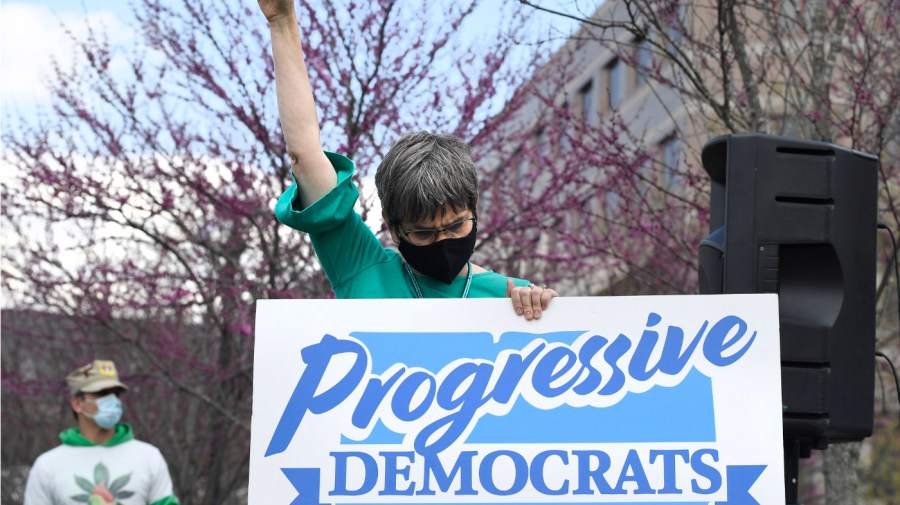Donald Trump’s victory is not just a consequence of his populist appeal or ability to manipulate the media. It is a systematic failure of the opposition to understand the mood of the country, its shifting demographics and its frustrations.
It is a failure of vision, empathy and courage. If we cannot see the roots of these changes, we are doomed to repeat them.
In a moment of crisis, people yearn for strong, simple solutions. This is where the Democratic Party has repeatedly faltered. We have become overly complex, bogged down in policy minutiae, while Republicans capitalize on a simple, emotive narrative.
They promise to protect the “soul” of America, even if that means subverting its democratic foundations. They speak to people’s fears — fear of losing their identity, their culture, their economic security. The Democratic response? A disjointed series of policies, some of which might be beneficial but are presented as esoteric, academic fixes for problems that feel distant to the average voter.
Trump, for all his flaws and authoritarian tendencies, speaks directly to people’s fears. He uses language that resonates with people who feel ignored, overlooked, or demonized. He doesn’t waste time with nuances.
He promises “America First,” and that’s a message that lands. It may be simplistic and divisive, but it’s effective. The GOP has learned how to harness the deep currents of resentment and fear running through the nation, particularly among white working-class voters who feel economically left behind.
This is not a crisis that can be solved by more identity politics or incremental policy shifts. This is a moment that requires the reinvention of a political vision that reconnects with the forgotten middle class, disillusioned youth, marginalized communities and working poor.
It means speaking to the issues that matter most: the rising cost of living, access to quality healthcare, economic mobility, and a future that feels within reach. Until we do that — until we can articulate a vision that resonates emotionally and intellectually — Trump will continue to expand his coalition.
The Democratic Party’s obsession with “woke” culture is not just a distraction — it’s a strategic error. It alienates moderates, especially in battleground states, and pushes voters into the arms of a party that promises cultural conservatism as a bulwark against a changing society.
But these voters don’t just want a return to traditionalism — they want answers. They want jobs, affordable housing, and a sense that the government is looking out for them. When they don’t get that from the left, they turn to a right-wing party that at least gives them something to rally behind, even if it’s rooted in fear and division.
Moreover, the progressive agenda, while vital in many ways, has become increasingly untethered from the concerns of the average voter. Universal healthcare, free college, and a Green New Deal are essential policies, but they are not the silver bullet that will shift the electorate. These policies are hard to sell when people are struggling to pay for gas and groceries.
The challenge for the Democratic Party isn’t just about offering more progressive ideas — it’s about making sure those ideas are rooted in the lived realities of the people we aim to serve. If we don’t connect on that level, we risk becoming a party of elites with little understanding of the struggles of ordinary Americans.
The party’s focus on “diversity” should not be dismissed outright, but it cannot be the only focus. Diversity without unity is just fragmentation.
And while we celebrate victories for marginalized groups, we must ask ourselves: What do we offer to all Americans who feel left behind by a changing economy and a fragmented society? Are we listening to the concerns of the white working-class voter who feels betrayed by both parties? Are we speaking to the disaffected youth who are tired of being told that their future is in crisis, yet see no meaningful solution on the horizon?
The Democratic Party’s lack of clear leadership has allowed the Republican Party to capitalize on this void, especially as their coalition continues to broaden, absorbing new segments of the population that once thought of themselves as Democrats.
The truth is, the Republican Party has become adept at framing itself as the party of change, even as it clings to outdated ideas. Republicans have exploited the growing polarization to their advantage, capitalizing on grievances while presenting themselves as the only true opposition to a corrupt elite.
This third election is another reminder of how badly we miscalculated. And if we do not correct course, we will find ourselves in the grip of a far more dangerous authoritarianism than what we see today. This isn’t just about losing an election — it’s about losing the future.
The solution is not simply electing better candidates or offering better policy platforms. It’s about restoring trust in the institutions that govern us, rebuilding a sense of shared purpose, and leading with integrity, empathy, and intellectual rigor. Until we do that, the path to authoritarianism will remain wide open, and the country will continue to fracture under the weight of its own divisions.
This is not just a wake-up call. It’s an urgent call to action. If we do not rise to the moment, we will not just lose the next election — we will lose the very soul of the country itself.
And make no mistake, this is not just about Trump. This is about the deep and systemic failure of the Democratic Party to meet the moment. If we can’t fix that, we will remain in a perpetual cycle of defeat.
Alex Gabriel is a political strategist and entrepreneur who was the senior advisor of LGBTQ+ and Youth Voter Engagement for Joe Biden’s presidential campaign and co-chaired the Out for Biden coalition.

